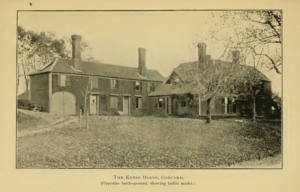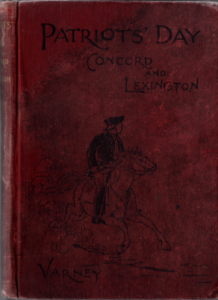This story is from the original manuscript of Thaddeus Blood of Concord, describing the ever memorable Concord fight with the British regulars on April 19, 1775, in which he was an active participant. He began as a minute-man, and worked up through the ranks until, in 1779, he became a ”Lieut, in Capt. Moses Barnes Company in Lieut.-Col. Perce’ Regt., stationed part of the time in R. I. and part in Swansey,” as stated in his own quaint phraseology. His account, says the Boston Journal (which has investigated the authenticity of this document), is of great value, as he was for many years thereafter a schoolmaster, and so learned to be extremely careful. Therefore, in points where his relation differs from the commonly accepted account of the day, it should not be cast aside as useless. The manuscript was obtained from the estate of Mr. Blood’s children by Colonel William Barrett, of Concord.
The spelling is original to the source where I found it. It was all one long paragraph, so I broke it up for easier reading. Enjoy.

Opposite battle ground – showing bullet marks
”The causes which led to hostilities between Great Britan & America are well known to all those acquainted with history. In Oct., 1774, Gen. Gage, having previously ordered the General Court to meet at Salem, & had dissolved or prorogued the court, the greater part of the members met at Salem notwithstanding, and formed themselves into a Provincial Congress and choce Doct. Warren President, and adjourned to Concord, & chose Mr. Hancock, President — they secretely agreed to make preparations to oppose the acts of Parliament, until we should have redress of the grievances we complained of (at that time and near a year after there was nothing said about Independance) — the Congress recommended the forming of companies of minute men, and the collecting of stores & camp equipage; a quantity of stores and cannon, etc., were collected & deposited in Concord, under the superintendence of Col. James Barrett, who had been a member of the General Court for many years, & then a respectable member of the Provincial Congress, and as great a patriot as was then, or perhaps ever, in Concord. He was requested by the Congress to encourage the forming of the companies, to guard the stores and to superintend the movements of the malisha, if called to action, and I heard him several times charge the companies not to fire first as we were marching to the Bridge. By his influence an armory for the manufacture of firearms and manufacture of saltpetre was set up in Concord, and it is my candid opinion that his name should be honorably handed down to posterity.
In Feb., 1775, the British attempted to take the cannon at Salem, but were disappointed. From that time there was a guard kept at Concord over the cannon & stores till five or six weeks after Concord fight — here it should be observed that we were all then British subjects, that the officers were nominally appointed over the companies of the Minute-men, that there was no commission nor any authority to commission until after Concord fight — except the malitia officers that were previously appointed by the King — that all the servises performed were voluntary, both of officers & men. On the 19th of April, 1775, about 2 o’clock in the morning, I was called out of Bed by John Barritt, a Sergt of the malitia compy to which I belonged (I was 20 years of age the 28th of May next following).
I joined the company under Capt. Nathan Barrett (afterward Col.) at the old Court House, about 3 o’clock, and was ordered to go into the Court House to draw amunition. After the company had all drawn their amunition we were paraded near the meeting house, & I should suppose that there was 60 or 70 men in Capt. Barrett’s company, for the company commonly consisted of 100 or over, & I think that about 30 join’d the minute companies or were sent to guard the cannon that was carried into the woods, &c., & that the whole of the malitia and minute-men of the town of Concord under arms that day was not less than 200, notwithstanding a Rev brother thinks there were but few of Concord about.
About 4 o’clock the several companys of Concord were joined by two companies from Lincoln, the malitia commanded by Capt. Perce (afterward Col.), & the minute com’y by Capt. Wm. Smith—the ven’l and hon’l Saml Hoar of Lincoln was one of his Lieuts—& were then formed, the minute on the right, & Capt. Barrett’s on the left & marched in order to the end of Meriam’s Hill, then so called, and saw the British troops a coming down Brook’s Hill; the sun was arising and shined on their arms & they made a noble appearance in their red coats and glising arms — we retreated in order over the top of the hill to the liberty pole erected on the heighth opposite the meeting house & made a halt; the main Body of the British marched up in the road & a detachment followed us over the hill & halted in half gun shot of us, at the pole; we then marched over the Burying ground to the road, and then over the Bridge to Hunt’s Hill, or Punkataisett, so called at that time, & were followed by two companies of the British over the Bridge, one company went up to destroy some stores at Col. James Barrett’s before mentioned, and they tarried near the Bridge, some of them went to Capt. David Brown’s, some Mr. Ephraim Buttrick’s, where Col. Jonas Buttrick now lives.
About 9 o’clock we saw a smoke rise at the Court House; it was proposed to march into town, and were joined by Westford and Acton companies, & were drawn up west of where Col. Jonas Buttrick now lives. Col. James Barrett, afore mentioned, rode along the line, & having consulted with the officers, &, as was observed, shouted not to fire first, they began their march. Robinson & Buttrick led — I say Robinson & Buttrick, for I do not know what offices they held, but this certain, they had no commissions till after that time, after Robinson was appointed Lieut. Col. & Buttrick Major. Upon our begin’g to march the company of British formed first on the cosway in platoons, they then retreated over the Bridge & in retreating took up 3 planks and formed part in the road & part on each side, our men the same time marching in very good order, along the road in double file.
At that time an officer rode up and a gun was fired. I saw where the Ball threw up the water about the middle of the river, then a second and a third shot, and the cry of fire, fire, was made from front to rear. The fire was almost simultaneous with the cry, and I think it was not more than two minutes, if so much, till the British run & the fire ceased — part of our men went over the Bridge & myself among the rest, & part returned to the ground they had left — after the fire every one appeared to be his own commander; it was tho’t best to go the east part of the Town & take them as they came back. Each took his own station, for myself I took my stand south of where Dr. Minot then lived, and saw the British come from Concord, their right flank in the meadows, their left on the hill. When near the foot of the hill, Col. Thomeson of Billerica came up with 3 or 4 hundred men and there was a heavy fire, but the distance so great that little injury was done on either side, at least I saw but one killed, a number of wounded. I know it has been said that Gen. Bridge commanded the regiment from Chelmsford & Bilerica. He might be some officer in the regiment, but it can be proved that Col. Tomson went with the regi’t to Cambridge and stood till the troops were organized, and, being old, Bridge was made Colonel.
 * From The Story of Patriots Day by George Varney – Published by Lee and Shepard Publishers 1895. The reproduction of this book is available now at Amazon.
* From The Story of Patriots Day by George Varney – Published by Lee and Shepard Publishers 1895. The reproduction of this book is available now at Amazon.

